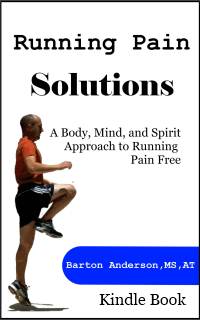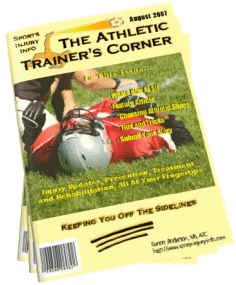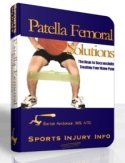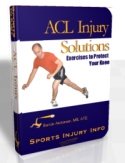Shoulder Rehab Exercises: Improving Mobility
Shoulder rehab exercises to improve mobility are slightly different from range of motion exercises. When I talk about mobility with my patients, I refer to joint motion, and restrictions that are caused by joint tightness. In the shoulder, mobility restrictions can be caused by the joint capsule. Mobility restrictions in the thoracic spine can also lead to mobility issues in the shoulder.I have included several shoulder mobility exercises below. I use them daily with my patients to improve their mobility, and to facilitate better range of motion in the shoulder. Improving Shoulder Capsule MobilityThe most common mobility restriction that I see in my patients is in the posterior shoulder capsule. Tightness in this part of the joint will cause several problems in the shoulder.
A tight posterior capsule will result in decreased internal rotation. Sometimes referred to as Glenohumeral Internal Rotation Deficit, or GIRD, this restriction can cause problems like shoulder impingement syndrome, and may lead to rotator cuff tendonitis.

To perform this stretch, simply pull your shoulder directly across your body, trying to pull your elbow as close to your shoulder as you can.
Hold for 10-15 seconds, repeat 5 times.
This stretch can help improve your posterior capsule, however, it is not as effective as the sidelying posterior capsule stretch because it does not stabilize your scapula.
The sidelying internal rotation stretch is a much more effective way of improving mobility of the posterior capsule. This is the shoulder stretching exercise that I give my patients to work on at home.
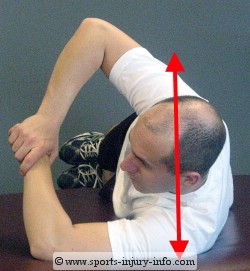
To perform this shoulder rehab exercise, begin by lying on your side, with the shoulder to be stretched on the bottom.
Your lower arm should be out in front of you, and your elbow bent to 90 degrees.
Make sure that your shoulders are straight up and down, as the red arrow indicates in the picture to the right. If you are leaning too far backward, you will not be able to effectively stretch the capsule.
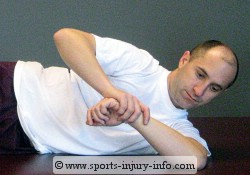
Once in this position, use your other hand to pull your arm down towards the floor or table.
This produces internal rotation of the shoulder, and will stretch the posterior capsule.
Your scapula will be stabilized because you are lying on your side.
You should feel this stretch in the back of your shoulder as you pull.
Hold for 10-15 seconds, repeat 5 times.Improving Thoracic Spine MobilityOne area of shoulder rehab exercise that is often overlooked is the thoracic spine. Believe it or not, the mobility of the thoracic spine plays a huge role in how much shoulder mobility and motion you have.
Our daily lives tend to leave us in a
poor posture position, with rounded and slumped shoulders. This lack of
thoracic extension can translate to loss of shoulder mobility,
especially with flexion overhead.
To improve
thoracic mobility I like to use a foam roller with my shoulder rehab
exercises. This is a great tool to
improve extension in the thoracic spine. It is not the most comfortable
exercise, but it works well.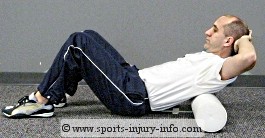
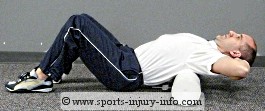
Roll yourself a little farther back, so the foam roller moves down your spine, and then repeat. Work your way down your spine and then back up, holding each stretch for 10-20 seconds.
Summary
Improving mobility is essential to restoring normal range of motion and shoulder function. Shoulder rehab exercises should focus on some type of capsular stretching, as well as improving thoracic extension.Didn't find what you were looking for? Search SII for more information...
Running Pain Solutions
Written for Runners by a runner, you'll learn a holistic approach to improving mobility, restoring normal movement and muscle activation patterns, and restoring the body and mind connection.
This Kindle Book contains a step by step program to keep you running pain free. Included are detailed instructions and illustrations for exercises to improve mobility, balance, neuromuscular control, strength and endurance. Only $7.49!
Get Your Copy Today!
